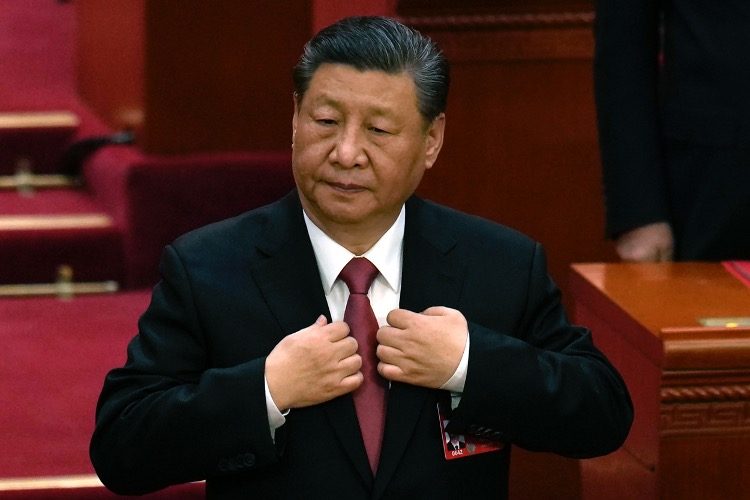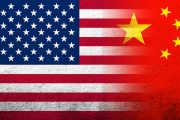
On March 27, Chinese President Xi Jinping met with American business leaders at the Great Hall of the People in Beijing amid Chinese government attempts to woo foreign investors back into the country and international firms seeking reassurance over new regulations.
Beijing wants to enhance growth this year in the world’s second-largest economy, after foreign direct investment into China fell eight percent in 2023 as investor concern rose over China’s controversial anti-espionage law, exit bans, and raids on consultancies and due-diligence firms.
Xi’s increasing focus on national security has left many companies uncertain where they might step over the line, even as Chinese leaders make public attempts to lure overseas investors.
“The history of China-US relations is a history of friendly exchanges between our two peoples,” Xi said, as quoted by state-controlled media, while calling on the two countries to “seek common ground and build more consensus.”
The United States and China have been gradually resuming engagements after relations between the two economic superpowers reached a historic low, clashing over trade policies, the future of Taiwan, and territorial claims in the South China Sea.
Some 20 firms were invited to participate in the gathering on March 27, as per two sources with knowledge of the matter, and the meeting ran for around 90 minutes, one of the sources said.
Stephen Schwarzman, co-founder and CEO of private equity firm Blackstone; Raj Subramaniam, head of American delivery giant FedEx; and Cristiano Amon, the boss of chips manufacturer Qualcomm, were among those who attended the meeting.
The two sources had no immediate comment on what was discussed at the meeting, which was organized by the National Committee on U.S.-China Relations, the U.S.-China Business Council, and the Asia Society think tank.
The three organizations did not immediately respond to media requests for comment on the meeting.
The gathering took place in the East Hall of the Great Hall of the People in Beijing, which is reserved for important functions. Attendees sat in a square formation around a large red, orange, and green floral installation, a video released by state media revealed.
Furthermore, the audience with Xi came after Chinese Premier Li Qiang’s move not to meet visiting foreign CEOs at the China Development Forum in Beijing on March 24-25, which prompted concerns over transparency in the world’s second-largest economy.
The chance to exchange views with Beijing’s second-ranking leader had become a major element of the summit in previous years.
Additionally, Xi told visiting Dutch Prime Minister Mark Rutte on March 27 that efforts to restrict China’s access to technology will not halt the country’s advance.
The Netherlands imposed export licensing requirements in 2023 on the sale of machinery that can make advanced processor chips. The move came after the United States blocked Chinese access to advanced chips and the equipment to make them, citing security concerns, and urged its allies to follow suit.
An online report from state broadcaster CCTV did not mention the chip machinery, but quoted Xi as saying that the creation of scientific and technological barriers and the fragmentation of the industrial and supply chains will give rise to division and friction.
“The Chinese people also have the right to legitimate development, and no force can stop the pace of China’s scientific and technological development and progress,” Xi said, as cited by media outlet CCTV.
Dutch company ASML is the world’s only producer of machines that use extreme ultraviolet lithography to make advanced semiconductors. In 2023, China became ASML’s second-largest market, accounting for 29 percent of its revenue as Chinese companies bought up equipment before the licensing requirement took effect.
ASML, the Netherlands’ largest company, recently threatened to leave China over anti-immigration policies that may affect the company’s ability to hire talent, leaving government officials rushing to ensure that the firm does not leave.
Rutte, speaking to journalists after his meeting, did not delve into details about the talks.
“What I can tell you is that … when we have to take measures, that they are never aimed at one country specifically, that we always try to make sure that the impact is limited, is not impacting the supply chain, and therefore is not impacting the overall economic relationship,” he said.
Trade Minister Geoffrey van Leeuwen Van Leeuwen said this week in an interview with The FD, a Dutch business newspaper, that protecting the interests of ASML is a top priority but admitted that national security comes before economic interests.
Beijing has repeatedly lambasted the United States for trying to stifle China’s economic development by restricting access to technology. In response, Xi has launched a campaign to develop home-grown chips and other high-tech products.
“China always opposes the US overstretching the concept of national security and making various excuses to coerce other countries into imposing a technological blockade against China,” Foreign Ministry spokesperson Wang Wenbin said in January.
Rutte said that NATO and its rising ties with Asia was not broached at the talks on March 27. Notably, Rutte is a leading candidate to be the next head of the alliance, which China has criticized for inciting regional tensions and making diplomatic forays into the Asia-Pacific region.
Rutte, who was accompanied by van Leeuwen on the trip, said the top issue for him in their meetings with Xi and Chinese Premier Li Qiang was the war in Ukraine.
China has adopted a neutral position on the Russia-Ukraine conflict, with Western mainstream media outlets reporting that Beijing has been providing Moscow with diplomatic cover and economic support through trade. As a result, China’s stance has angered and frustrated much of the globalist governments in Europe, which regard Russia as the aggressor and Ukraine as the victim.
Rutte said it was vital for China to understand that “this is a direct security threat for us, because if Russia is successful in Ukraine, it will be a threat to the whole of Europe. It will not end with Ukraine.”
He added that he had asked China’s leaders “to put their considerable weight — and they can do that as far as I’m concerned in a very discreet way — but as much as possible on Russia to influence the course of events.”


